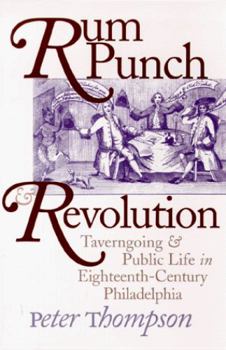Rum Punch and Revolution: Taverngoing and Public Life in Eighteenth-Century Philadelphia
(Part of the Early American Studies Series)
Select Format
Select Condition 
Book Overview
'Twas Honest old Noah first planted the Vine
And mended his morals by drinking its Wine.
--from a drinking song by Benjamin Franklin
Format:Paperback
Language:English
ISBN:0812216644
ISBN13:9780812216646
Release Date:December 1998
Publisher:University of Pennsylvania Press
Length:296 Pages
Weight:0.95 lbs.
Dimensions:0.7" x 6.0" x 8.9"
Customer Reviews
2 ratings
Rum Punch & Revolution: Taverngoing & Public Life in Eighteenth Century Philadelphia.
Published by Thriftbooks.com User , 14 years ago
Rum Punch & Revolution: Taverngoing & Public Life in Eighteenth Century Philadelphia. Author: Peter Thompson. 265 pages. 1998. When visiting the gift shops of several local historic sites you often see titles related to taverns or drinking in colonial society. Having eaten and imbibed in several period taverns I finally felt ready to read up on the role of taverns and drinking in this period of American history. This book is not written for the casual reader it is deeply rooted in the academic writing style. In other words about a third of the text is used to reference the text as in, "as we will see in the third chapter", or "... as was covered in the previous chapter". Frankly this style of telling me what I am going to read now and later as well as what I just read and trying to link everything at all times is like reading Karl Marx and Friedrich Engels. It is too bad that this writing style was allowed to infect and dominate the social history movement. The message in the book itself is an interesting one. The author makes a case for the uniqueness of tavern culture in Philadelphia as opposed to other nascent American cities along the Atlantic Seaboard of the Colonial and into the Federal Era. The author makes a case for the evolution of the role and meaning of the tavern in Philadelphia society. The book approaches the issue in a general history of taverns across the seaboard and in England. The author then describes their planting in Philadelphia and their early development. This stage lasts until their fundamental societal change after the Revolution and into the prosperity of the Federal era. The author approaches the study through the legal boundaries and definitions of taverns and their operations, the role and history of the tavern keepers and finally the patrons themselves. In a previous review of the book; Inns, tales, and taverns of Chester County, I noted that; "...the classification of various taverns and how you could tell who the patrons were by the names. The classifications for taverns from the in terms of social ranking from highest to the lowest were stage stand, wagon stand, drove stand, and the tap-house. The stage stand served coach travelers, business men, and the wealthy. A wagon stand served wagoneers and teamsters hauling supplies from rural areas to port cities for sale or export. Drove stands were used by immigrants, local workers, and by those herding livestock to markets. The poorest of the population patronized tap-houses as a meeting place. You could go down but not up. Prices and quality varied by class as well. " In Philadelphia this was not the case until during the Federal Period after the revolution. There existed in the city a mingling of classes shoulder to shoulder around the tap. There were though two general types of taverns. The first was the multi-service tavern and the other was the ale or dram shop which only sell spirits or ale. These classifications were driven by the
An entertaining bit of social history and more
Published by Thriftbooks.com User , 15 years ago
As a pure piece of social history, this is a lovely piece of work. Those of us who enjoy the perspective of daily life have to be thrilled. Thompson takes us into the actual social life of tavern-goers in one of America's most tavern-friendly cities. That his inquiry is set in the 18th century and that it concerns the founding of American democracy is a splendid bonus. That it is a scourge to Prohibitionists is a minor blessing. But what makes this book so delightful is that in the election season of 2008, it offers a look at a conscious attempt to manipulate public opinion by a Keithian minority among Philadelphia's Quakers. Both the main and the rump groups have become largely irrelevant today, but the Rovian air about the way the controversy was conducted: whispered innuendos in taverns, suggestions without accusations about the moral character of opponents. Long before Walter Lippmann, public opinion was being consciously manipulated. "Philadelphians" Thompson writes "interpreted provincial policy by reference to the small politics of everyday life." Philadelphians still do that, and I suspect that they are not alone. Lynn Hoffman, author of The New Short Course in Wine





